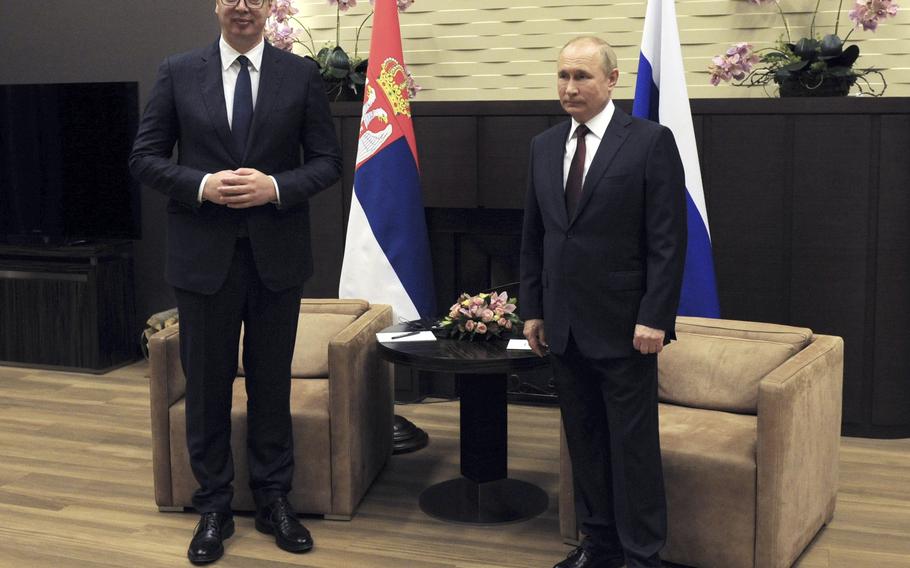
Russian President Vladimir Putin, right, and Serbian President Aleksandar Vucic pose during their meeting in Sochi, Russia, Thursday, Nov. 25, 2021. (Mikhail Klimentyev, Sputnik, Kremlin Pool Photo/AP)
MOSCOW - A Russian prosecutor Thursday called on the Supreme Court to abolish one of Russia’s most prominent human rights groups, the International Memorial Society, part of a comprehensive crackdown on all such groups in the country.
The International Memorial Society is renowned for researching and memorializing the Soviet-era executions and imprisonment of dissidents. Its human rights wing, Memorial Human Rights Center, exposes the current abuses by Russian authorities and played a leading role in revealing military atrocities during the two Chechen wars in the mid-1990s and early 2000s.
Under the tightening authoritarian rule of President Vladimir Putin, Memorial has been under pressure for years, but the bid to close it down shocked global human rights advocates and observers of Russia.
Both wings of the organization have been declared “foreign agents,” and must meet onerous requirements, including putting “foreign agent” warnings on all published materials, as well as tough reporting rules on finances.
Prosecutor Dmitry Vagurin on Thursday accused the International Memorial Society of deliberately and systematically concealing its foreign agent status by failing to tag all items with the necessary labels, Russian media reported.
He argued that liquidating the group was a “proportionate” measure. The organization argues it has taken strenuous efforts to meet requirements.
The prosecution argued that Memorial “violated the rights and freedoms of citizens, namely the right to freedom of information.”
Memorial advocate Grigory Vaipan told the court that prosecutors had found “an insignificant share” of Memorial’s materials that did not carry the label.
Human Rights Watch spokeswoman Tanya Lokshina recently called the move to shutter Memorial an “outrageous assault on the jugular of Russia’s civil society,” and European diplomats have expressed their alarm.
U.S. Secretary of State Antony Blinken condemned the move on Twitter earlier this month, saying, “Russia must end the lawsuits and stop misusing its law on ‘foreign agents’ to harass, stigmatize, and silence civil society.”
German President Frank-Walter Steinmeier said Monday he was “stunned” by the moves to close the organization, while the European Union’s foreign policy chief, Josep Borrell, said it would be an “irreparable loss.”
The Memorial Human Rights Center was declared a “foreign agent” in 2014, a tag its supporters say recalls the stigmatizing Soviet-era designation “enemy of the state.”
The other wing, the International Memorial Society, was placed on the register of foreign agents in 2016 and has since faced police raids and repeated court fines over improper labeling claims.
Lokshina said Russian authorities last year broadened the law on foreign agents, meaning that almost any activist or civic organization could be declared a foreign agent. Authorities use the law as a tool of repression “to restrict space for civic activity and penalize critics, including human rights groups,” she added.
The court Thursday adjourned the hearing until Dec. 14.
Memorial was founded In the late 1980s - during the final years of the Soviet Union - by some of Russia’s most renowned rights advocates, including Nobel laureate Andrei Sakharov, a physicist-turned-dissident who had been arrested and exiled from Moscow by Soviet authorities in 1980.
The organization began setting up branches in 1987 and was formally established in January 1989, after Soviet leader Mikhail Gorbachev’s reforms.
At that time and after the fall of the Soviet Union in 1991, a mood swept the country that the abuses of the KGB secret police in Soviet times must be remembered, so that such crimes would never be repeated.
In August 1991, Russians tore down a statue of Felix Dzerzhinsky, a former head of Soviet intelligence. After the fall of the Soviet Union, access to the KGB archives was opened up, although for personal materials, scholars needed to obtain permission from prisoners or their relatives.
Memorial delved into the archives, painting a comprehensive portrait of lives of people consigned to the gulag, or Soviet prison camp system, and Soviet-era abuses.
As president, Putin, a former KGB officer, has curbed freedom of speech and civil liberties, and launched a far-reaching crackdown on the opposition and political activists. He has also changed the constitution so that he can now rule until 2036.
Critics of the regime, such as Putin’s main political rival Alexei Navalny, who was poisoned in a failed state assassination attempt according to the State Department, have been jailed. Navalny’s political organization was declared extremist and banned. Major opposition figures were also barred from running for elections.
Activists, human rights lawyers and independent journalists have fled into exile to avoid imprisonment, and members of religious groups such as the Jehovah’s Witnesses have been branded extremists, raided and jailed.